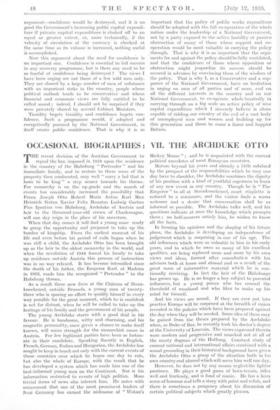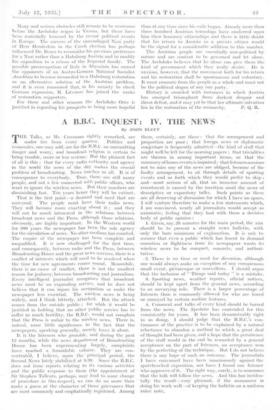OCCASIONAL BIOGRAPHIES : VII. THE ARCHDUKE OTTO
THE recent decision of the Austrian Government to repeal the ban imposed in 1919 upon the residence in the country of the Habsburg " Pretender " and his immediate family, and to restore to them some of the property then confiscated, may well " carry a lad that is born to be king" a step nearer towards his throne. For monarchy is on the up-grade and the march of events has considerably increased the possibility that Franz Joseph Otto Robert Maria Anton Karl Max Heinrich Sixtus Xavier Felix Renatus Ludwig Gaetan Pius Ignatius von Habsburg, Archduke of Austria and heir to the thousand-year-old crown of Charlemagne, will one day reign in the place of his ancestors.
When that day comes it will find a young man' ready to grasp the opportunity and prepared to take up the burden of kingship. From the earliest moment of his life and even before his period of exile began when he was still a child, the Archduke Otto has been brought up as the heir to the oldest monarchy in the world, and when the revolution of 1918 forced his family to take up residence outside Austria this process of instruction was in no way relaxed. It has become intensified since the death of his father, the Emperor Karl, at Madeira in 1928, made him the recognized " Pretender " to the Habsburg throne.
As a result there now lives at the Château of Steen- knoekezeel, outside Brussels, a young man of twenty- three who is sparing no effort to qualify himself in every way possible for the great moment, which he is confident is not far distant, when he will be called to take up the heritage of his family and the government of his people. The young Archduke starts with a good deal in his favour. He is handsome, witty and charming, and his magnetic personality, once given a chance to make itself known, will mean strength for the monarchist cause in Austria. For few legitimist parties have been so fortun- ate in their candidate. Speaking fluently in English, French, German, Italian and Hungarian, the Archduke has sought to keep in touch not only with the current events of those countries over which he hopes one day to rule, but also the whole of Europe, with the result that he has developed a system which has made him one of the best-informed young men on the Continent. Nor is his information restricted to events of high politics. More trivial items of news also interest him. He notes with amusement that one of the most prominent leaders of Nazi Germany has earned the nickname of " Wotan's Mickey Mouse " ; . and he is acquainted with the current political anecdotes. of most European countries.
Mature beyond his years and already a little subdued by the prospect of the responsibilities which he may one day have to shoulder, the Archduke combines the dignity of his -position with a kind of youthful eagerness to learn of any new event in any country. Though he 'is " The Emperor " to all at Steenknockezeel, court etiqtiette is reduced to a minimum, and the visitor finds a warm welcome and a desire that conversation shall be as informal as possible. . The Archduke talks well, and his questions indicate at once the knowledge which .prompts them ; no half-answers satisfy him, he wishes to know all the facts.
In forming his opinions and the shaping of his future plans, the Archduke is developing an independence of judgement which is surprising in. one of his age. The old influences which were so valuable to him in his early years, and to which he owes so many. of .his excellent qualities, are being replaced more and more by his own views and ideas, formed after consuItaticn with his advisers both at home and abroad and as a result of the great mass of informative material which he is con- tinually receiving. In fact the heir of the Hapsburgs has grown up. He is no longer a boy subject to parental influences, but a young , prince who has crossed the threshold of manhood and who likes to make up his mind for himself.
And his views are sound. If they are ever put into practice Europe will. be surprised at the breadth of vision revealed in the policies which have been prepared against the day when they will be needed. Some idea of them may be gained from the theses prepared by the Archduke when, as Duke of Bar, he recently took his doctor's degree at.the University of Louvain. The views expressed therein were modern and progressive and smacked not at all of the musty dogmas of the Hofburg. Constant study of current national and international affairs combined with a sound grounding in their historical background have given the Archduke Otto a grasp of the situation both in his own country and abroad which will serve him well one day.
However, he does not by any means neglect the lighter pastimes. He plays a good game of lawn-tennis, rides well and fearlessly, and is fond of music.° He has a keen sense .of humour and tells a story with point and relish, and there is sometimes a pungency about his discussion of certain political subjects which greatly pleases. Many and serious obstacles 'still remain to be overcome before the Archduke reigns in Vienna, but these have been materially lessened by the recent political events in Europe. The success of the camouflaged Nazi party of Herr Henderlein in the Czech election has perhaps influenced Dr: Benes to reconsider his previous preference for a Nazi rather than a Habsburg Austria and to modify his opposition to a return' of the Imperial family. The ' possible preoccupation of Italy in 'Abyssinia has caused the opponents of an AuStro--Gerinan National Socialist Anschluss to become reconciled to a Habsburg restoration as ' an alternative solution of the Austrian ptOblem, and it is even rumoured that, in his anxiety to check German expansion, M. Litvinov has joined the ranks of restoration supporters.
For these and other reasons the Archduke Otto is justified in regarding his prospects as being more hopeful than at any time since his exile: began. Already mote than three hundred Austrian townships have conferred upon 'him their* honorary citiZenships aired there is little., doubt that his" return to Austria as a private citizen would ' be the signal for a considerable addition to this number.
The Austrian people are essentially non-political by nature and are content to be governed and let alone. The Archduke believes that he alone can give theM the 'kind of government which they really desire. He is ' anxious, however, that the movement both for his return and his restoration shall be spontaneous and voluntary. It must emanate from the people as a. whole and must not be the political slogan of,any One party. • • • .
• Histdry is crowded with instances-in which Austria has emerged 'triumphant from' darkest despair' and direst defeat, and it may yet be that her ultimate Salvation lies in the restoration of the monarchy. P. Q.•











































 Previous page
Previous page